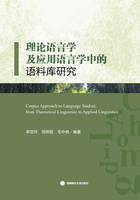
Personal Pronouns in Chinese Students' Academic Texts: Choice and Principles
Changchun Normal University
Abstract:Much research on written academic discourse recently focuses on the interactivity between writers and their potential readers. A majority of the explorations analyse the interactive features from the perspective of the pragmatic functions, which are achieved by various language choices. One of these choices is the use of first person pronouns as a manifestation of self-representation in academic discourse. However, there are few studies discuss quantitatively on what might have influenced the writers to make the choices between impersonal expressions and first person pronouns in their academic texts. Based on a self-complied corpus, the author attempts to discuss 5 principles that influence Chinese EFL novice writer to certain choices of the first person pronouns, I, we and other impersonal expressions in their dissertations. Other factors that may restrain these choices are also explored. This pedagogical oriented paper is mainly quantitative and interprets the proposed principles from an EAP teacher-researcher perspective. The illustration and discussion of the principles may shed light on teaching and learning academic writing in EAP classroom in Chinese context.
Keywords:First Person Pronouns; Academic Discourse; Chinese EFL Writer
1. Introduction
Research discourse is no longer considered as monolithic. Much research on written academic discourse recently focuses on the interactivity between writers and their potential readers(Bazerman,1984; Ivanič,1998; John,2005; Swales,1990). Scholars (Ivanič,1998; Ivanič&Camps,2001)argue that writer-reader interaction can be found in every aspect related to language choices in a text, for example, lexis, syntax and organization. One of these many choices is the use of first person pronouns (FPPs)to project writer themselves in academic discourse. The employment of FPPs is to achieve designed pragmatic goals. For example, studies on FPPs show that these explicit expressions of writer self-presentations serve discourse functions of, among many others, organising discourse, describe research procedure, claim authority or news worthiness(Ädel,2006; Fløttum et al.,2006; Harwood,2005a,2005b,2007; Kuo,1999;Hyland,2001,2004,2015). They also represent writer identity and authorial power manifested in the text(Hyland,2002; Ivanič,1998; Tang&John,1999). Consequently, the employment of the FPPs is considered as“a key element of successful academic writing”(Hyland,2002:1093-1094). In Chinese EFL academic classrooms, regrettably, teaching and learning the use/non-use of FPPs have been unsatisfactory. The oversimplified instructions, either remove all the FPPs or replace them with passive voice in their academic texts, are least helpful with respect of self-presentation in novice learners' academic discourse. Exploring what is behind those choices of I and we in students'academic discourse would help both teachers and apprentice writers to the appropriate use of I and we in teaching and learning academic discourse.
Of all the FPPs, I, we, me, us, my, mine, and ours, I chose to investigate only two of them, I and we in Chinese EFL learners'academic texts. It is because I and we are the most obvious expressions of self-projection in discourse, therefore, the most powerful means to assert the writer's claim and to establish his/her authority in the academic community (Quirk et al., 1985). In this paper, instead of discussing extensively on the empirical data retrieved from the corpus, I attempt to interpret some principles of using/not using the two most authorial personal pronouns, I and we in the students academic discourse. Choices between I, we and other impersonal expressions are discussed in depth. The discussion is assisted with illustrations drawn from the corpus and elaborated from my perspective as an EAP teacher with admitted subjectivity. It should also be noted that when the FPPs are discussed, they are discussed with the main verbs that collocate with them. This is because when they represent the writer of the theses, the verb collocate with them indicate what they ‘do'in the texts. Therefore, decide the pragmatic function and present intended effect of the employment of the FPPs.
In the following sections, I first present recent research on FPPs in academic discourse, then move to the discussion of the choice between personal pronouns vs. impersonal expressions in academic discourse, to the choice between singular I vs. collective we in the student writers' sample texts.